Presidents Day
In honor of the Presidents Day holiday, this is our last issue until Tuesday, February 22, Washington's birthday. See you then!
In honor of the Presidents Day holiday, this is our last issue until Tuesday, February 22, Washington's birthday. See you then!
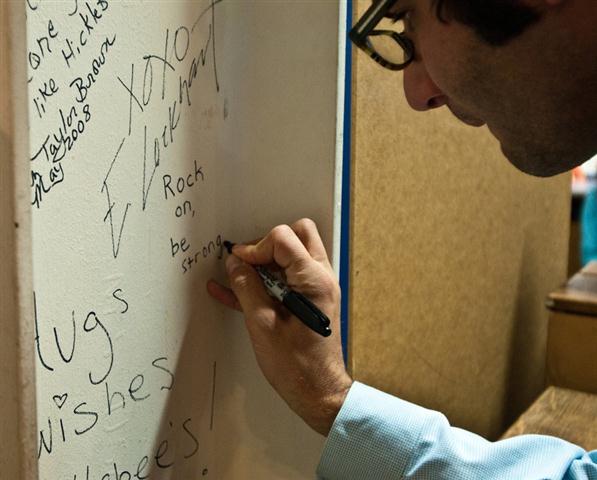 Last Saturday at Hicklebee's Bookstore,
San Jose, Calif., Ned Vizzini, author of YA books including It's Kind of a
Funny Story (now a movie) and Be More Chill (both from Hyperion), signed the
wall in the store's Museum.
Last Saturday at Hicklebee's Bookstore,
San Jose, Calif., Ned Vizzini, author of YA books including It's Kind of a
Funny Story (now a movie) and Be More Chill (both from Hyperion), signed the
wall in the store's Museum.
 In reaction to the bankruptcy filing of REDgroup Retail, owner of Borders, Angus & Robertson and Whitcoulls stores in Australia and New Zealand, several observers said that REDgroup Retail's problems stemmed from mismanagement against a backdrop of a strong Australian dollar (now on par with the U.S. dollar) that makes ordering online and from abroad cheaper than ever, high rents and parallel importation laws that have restricted competitiveness even as they protect significant aspects of Australian book publishing. In addition, some online offshore retailers are offering free shipping, they don't charge the goods and services tax that Australian retailers do and purchases from them are not subject to duty fees.
In reaction to the bankruptcy filing of REDgroup Retail, owner of Borders, Angus & Robertson and Whitcoulls stores in Australia and New Zealand, several observers said that REDgroup Retail's problems stemmed from mismanagement against a backdrop of a strong Australian dollar (now on par with the U.S. dollar) that makes ordering online and from abroad cheaper than ever, high rents and parallel importation laws that have restricted competitiveness even as they protect significant aspects of Australian book publishing. In addition, some online offshore retailers are offering free shipping, they don't charge the goods and services tax that Australian retailers do and purchases from them are not subject to duty fees.
Quoted by crikey.com, Australian Publishers Association CEO Maree McCaskill noted, "Consumer buying habits are changing, people want to shop online and more and more Australians are taking advantage of the high dollar, where they can get books cheaper overseas. They have no loyalty to Australian businesses, they don't care where they buy anything. I can't particularly blame them for that but you do see in other markets such as Europe a much greater pride and concern about their country's own business."
And Scribe Publications head Henry Rosenbloom said that REDgroup Retail's owner, Private Equity Partners, was a poor leader. "The managers were bovver boys [skinheads, mindless thugs] who alienated all their inherited knowledgable staff (who left), made appalling decisions about stock selection and presentation and tried to treat books like potatoes. They never listened so their business declined drastically and they ended up trying to sell giftware instead of books." REDgroup Retail's Borders and Angus & Robertson stores in Australia represent about 30% of Australia's bookstore market. In New Zealand, REDgroup Retail's five Borders and 65 Whitcoulls stores represent about a quarter of all bookstores in the country and account for 1,400 jobs, according to Radio New Zealand, which quoted industry officials as saying that they thought Whitcoulls is on solid footing and hopefully will survive unscathed.
REDgroup Retail's Borders and Angus & Robertson stores in Australia represent about 30% of Australia's bookstore market. In New Zealand, REDgroup Retail's five Borders and 65 Whitcoulls stores represent about a quarter of all bookstores in the country and account for 1,400 jobs, according to Radio New Zealand, which quoted industry officials as saying that they thought Whitcoulls is on solid footing and hopefully will survive unscathed.
In one unhappy effect of bankruptcy administration, all REDgroup Retail booksellers are now requiring gift card holders wanting to redeem the cards to buy at least double the amount of what's on the card. Thus under what many are calling a "double or nothing" policy, a customer using a $20 card needs to spend at least $40.
--- In two successive days, the major partners of Kobo, the e-reader and e-book company spun off from Indigo's Shortcovers e-book service, have declared bankruptcy: Borders Group in the U.S. and REDgroup Retail in Australia and New Zealand. The two retail groups, which include Borders Australia and A&R/Whitcoulls, sell the Kobo e-reader in their stores.
In two successive days, the major partners of Kobo, the e-reader and e-book company spun off from Indigo's Shortcovers e-book service, have declared bankruptcy: Borders Group in the U.S. and REDgroup Retail in Australia and New Zealand. The two retail groups, which include Borders Australia and A&R/Whitcoulls, sell the Kobo e-reader in their stores.
"In the short term, it seems inevitable that the device will be sold in fewer physical retail outlets," Quill & Quire commented. "Kobo, meanwhile, has assured customers in the affected countries that the insolvency of REDgroup and Borders will have no impact on the availability of Kobo e-books."
The only solvent non-Canadian part of Kobo is Cheung Kong Holdings, a Hong Kong property development and strategic investment company. Indigo remains the majority shareholder in Kobo.
---
 On 38enso.com, the website for 38enso Publishing Services, owner Jack W. Perry, a Waldenbooks veteran and now a consultant and literary agent, noted that "Borders did a lot of things right too." Among them:
On 38enso.com, the website for 38enso Publishing Services, owner Jack W. Perry, a Waldenbooks veteran and now a consultant and literary agent, noted that "Borders did a lot of things right too." Among them:
---
Overheard yesterday on the public address system in one of the 200 Borders stores that are closing: "Does anyone know if we're still shipping items out of the store?"
---
 Spurred by Subterranean Books' announcement earlier this month that it might have to close when its lease runs out September 1 (Shelf Awareness, February 4, 2011), that store has joined with Left Bank Books, Pudd'nhead Book and Main Street Books to form the St. Louis Independent Bookstore Alliance "to help raise awareness of their stores and their unique contributions to their local communities," Bookselling This Week reported.
Spurred by Subterranean Books' announcement earlier this month that it might have to close when its lease runs out September 1 (Shelf Awareness, February 4, 2011), that store has joined with Left Bank Books, Pudd'nhead Book and Main Street Books to form the St. Louis Independent Bookstore Alliance "to help raise awareness of their stores and their unique contributions to their local communities," Bookselling This Week reported.
The Alliance, which is on Twitter and has a Facebook page, aims to set up a website that will offer a monthly bestseller lists, an events calendar, a city-wide reading group, resources for local authors and more. The group also plans a St. Louis independent bookstore tour and a technology petting zoo, among other activities.
"St. Louis has an extraordinary number of independent bookstores, both general service and specialty," Pudd'nhead Books owner Nikki Furrer told BTW. "Instead of bemoaning corporate chain stores or e-books or harmful online stores, we should be celebrating the fact that St. Louis is one of the most literate cities in the country, with a thriving literary arts scene for both children and adults, and an independent bookseller for everyone's reading tastes."
---
 Susan McBeth, former director of marketing and events at Warwick's Bookstore, La Jolla, Calif., has launched Adventures by the Book, a company that aim to help readers connect with authors and other readers in a more intimate setting that through a traditional speaking or lecture format--through adventure travels and events. For example, the company will bring the Ladies, Lunch & Literacy program, popular in Los Angeles, to San Diego; create weekend getaways like the upcoming Weekend at Tiffany; and organize trips like Adventure Under the Tuscan Sun.
Susan McBeth, former director of marketing and events at Warwick's Bookstore, La Jolla, Calif., has launched Adventures by the Book, a company that aim to help readers connect with authors and other readers in a more intimate setting that through a traditional speaking or lecture format--through adventure travels and events. For example, the company will bring the Ladies, Lunch & Literacy program, popular in Los Angeles, to San Diego; create weekend getaways like the upcoming Weekend at Tiffany; and organize trips like Adventure Under the Tuscan Sun.
For more information, go to adventuresbythebook.com; 619-300-2532; adventuresbythebook@gmail.com.
---
(Hilarious) book trailer of the day: An Improvised Life: A Memoir by Alan Arkin (Da Capo Press), which appears in March.
---
The National Book Foundation has launched its NBA Poetry blog,
featuring curatorial appreciations of each of the 51 Winners of the
National Book Award for Poetry since 1950. The blog will have essays by
contemporary poets, representing diverse poetic styles, exploring some
of the greatest American poets and their books. An original essay will
be published each weekday from, now until the middle of May. Each blog
page also includes the original book cover, a photograph of the author, a
list of the National Book Award judges and finalists for that year
(when available), and related material and links.
---
Remember
the books you read when you were young that altered everything? "These
were the world-changers, the reality-definers, the stories you died
over, gushed to your friends about, pushed into the hands of boyfriends
and girlfriends, urgently, sincerely. They were pivotal, inspirational,
important?"
Well, those days are long gone. Flavorwire showcased "Books That Rocked Your World at 16 But Fall Flat Now."
---
And what about your "favorite cult novels that are dying for big-screen adaptations?" Flavorwire offered a few suggestions.
This week it seems as if every local and national media outlet has been on the lookout for independent booksellers to share their opinions on the Borders bankruptcy situation.  "It's not good overall for the book industry when such a giant chain goes down," Dana Brigham, co-owner of the Brookline Booksmith, told the Boston Herald. "There are fewer places to buy books and that's a concern (for authors and publishers)."
"It's not good overall for the book industry when such a giant chain goes down," Dana Brigham, co-owner of the Brookline Booksmith, told the Boston Herald. "There are fewer places to buy books and that's a concern (for authors and publishers)."
Added Steve Fischer, executive director of the New England Independent Booksellers Association: "While we represent independent booksellers, we are not gleeful over this news. Our hope is that some of the closed locations will be taken over by independents."
--- 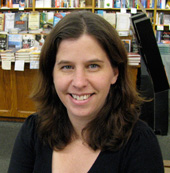 In Santa Cruz, Calif., where the opening of Borders in 2000 just two blocks from Bookshop Santa Cruz prompted a public response that included "Books Without Borders" bumper stickers and protests, the Patch reported that the closing of the Pacific Avenue location will not be a cause for mourning as far as owner Casey Coonerty Protti is concerned: "Borders's opening had a big impact on Bookshop. Luckily, we do business in Santa Cruz, which is incredibly supportive of locally owned business, so we were able to weather challenges of Borders being down the street.... We're looking forward to reinvesting in the business in a way we haven't been able to do in the last two years so that we will be a strong bookstore for the community."
In Santa Cruz, Calif., where the opening of Borders in 2000 just two blocks from Bookshop Santa Cruz prompted a public response that included "Books Without Borders" bumper stickers and protests, the Patch reported that the closing of the Pacific Avenue location will not be a cause for mourning as far as owner Casey Coonerty Protti is concerned: "Borders's opening had a big impact on Bookshop. Luckily, we do business in Santa Cruz, which is incredibly supportive of locally owned business, so we were able to weather challenges of Borders being down the street.... We're looking forward to reinvesting in the business in a way we haven't been able to do in the last two years so that we will be a strong bookstore for the community."
Protti added, "We understand that losing a business downtown is a hard thing, and we feel sorry for that situation... but for Santa Cruz, where we really were taking away from each other, it's exciting to be able to think forward and run the business we've been wanting to.... Mostly I've been thinking about how incredibly grateful I am for our customers, who saved us once during the earthquake in '89, and now they've saved the store again, by getting us through this 10 years."
---
The Sacramento Bee reported that some "area independent bookstore owners are hoping to reap a benefit" from the developments, even though none of the five Borders stores in the Sacramento area will be among the 35 California stores scheduled to be closed.
Stan Forbes of the Avid Reader at the Tower, Sacramento, said the closures "will impact (national) book buyers psychologically and make them inclined to be supportive of their independent bookstores." The bankruptcy filing "is the cost of (consumers) buying digital books. If you want to have bookstores, you have to buy books there and not online." At the Avid Reader, Davis, Alzeda Knickerbocker sees the Borders dilemma as "a recalibration of the market (based on) the fact that there simply isn't enough business to support two large chains anymore." She noted that there could be an opportunity for indies: "As the book market downsizes, smaller bookstores in niche markets should find a place and fulfill smaller needs. It's an opportunity for (readers) to discover what a good job the independents do."
At the Avid Reader, Davis, Alzeda Knickerbocker sees the Borders dilemma as "a recalibration of the market (based on) the fact that there simply isn't enough business to support two large chains anymore." She noted that there could be an opportunity for indies: "As the book market downsizes, smaller bookstores in niche markets should find a place and fulfill smaller needs. It's an opportunity for (readers) to discover what a good job the independents do."
---
John Netzer, general manager of the Concord Bookshop, Concord, Mass., said, "They were rescued a couple of years ago. I'm not surprised, and I'm not disappointed." He told the Concord Patch "it's the nature of the book business. Online businesses and chains have all been hurt as much as independent bookstores."
---  In an e-mail letter to her customers, Roxanne Coady, owner of R.J. Julia Booksellers, Madison, Conn., responded to the Borders bankruptcy and other changes in the industry by suggesting that "it may be time for us to have a series of conversations, in person and online, on how we can remain vital to you. What new service might be helpful? What educational courses? What on-line capability? What merchandise? Or is it all about price, ease of delivery, etc?" Coady invited anyone interested to "join me for tea on Friday February 25th at 3:30, or wine and cheese on March 7th at 7pm, for us to begin the dialogue."
In an e-mail letter to her customers, Roxanne Coady, owner of R.J. Julia Booksellers, Madison, Conn., responded to the Borders bankruptcy and other changes in the industry by suggesting that "it may be time for us to have a series of conversations, in person and online, on how we can remain vital to you. What new service might be helpful? What educational courses? What on-line capability? What merchandise? Or is it all about price, ease of delivery, etc?" Coady invited anyone interested to "join me for tea on Friday February 25th at 3:30, or wine and cheese on March 7th at 7pm, for us to begin the dialogue."
---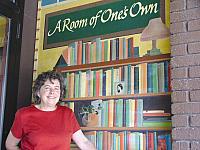 The Wisconsin State Journal reported that although Sandi Torkildson's A Room of One's Own Books, Madison, isn't in the dire situation that faces Borders, which plans to close its University Avenue store, she "still wouldn't mind some assurances about her bookstore's future. That's why A Room of One's Own has asked its customers to pledge to buy at least five more books this year compared with last year. Then, the store's owners will gauge the response to help decide whether to renew the lease in 18 months."
The Wisconsin State Journal reported that although Sandi Torkildson's A Room of One's Own Books, Madison, isn't in the dire situation that faces Borders, which plans to close its University Avenue store, she "still wouldn't mind some assurances about her bookstore's future. That's why A Room of One's Own has asked its customers to pledge to buy at least five more books this year compared with last year. Then, the store's owners will gauge the response to help decide whether to renew the lease in 18 months."
"It's not that we're in trouble," said Torkildson. "It's just a reminder.... We have good customers. We think it will be successful."
Sunday on the Today Show: Paul and Shannon Morell, authors of Misconception: One Couple's Journey from Embryo Mix-Up to Miracle Baby (Howard, $14.99, 9781451610567).
---
Sunday night on 60 Minutes: Mark Logue, co-author of The King's Speech: How One Man Saved the British Monarchy (Sterling, $14.95, 9781402786761).
Also on 60 Minutes: Senator Scott Brown, author of Against All Odds: My Life of Hardship, Fast Breaks, and Second Chances (Harper, $27.99, 9780062015549). He appears on Monday on the View, too.
---
Monday morning on the Today Show: Amy Goodman, author of Wear This, Toss That! (Atria, $27, 9781439184417).
---
Monday morning on Good Morning America: Mike Huckabee, author of A Simple Government: Twelve Things We Really Need from Washington (and a Trillion That We Don't!) (Sentinel, $26.95, 9781595230737).
---
Monday on NPR's Tell Me More: Clarence Lusane, author of The Black History of the White House (City Lights Publishers, $19.95, 9780872865327).
---
Monday on NPR's Diane Rehm Show: Douglas Waller, author of Wild Bill Donovan: The Spymaster Who Created the OSS and Modern American Espionage (Free Press, $30, 9781416567448).
---
Monday on NPR's Marketplace: Gideon Rachman, author of Zero-Sum Future: American Power in an Age of Anxiety (Simon & Schuster, $27, 9781439176610).
---
Monday night on the Late Show with David Letterman: Donald Rumsfeld, author of Known and Unknown: A Memoir (Sentinel, $36, 9781595230676).
Jack Bender (Lost) will direct the Fox medical drama pilot Weekends at Bellevue, based on Dr. Julie Holland's memoir, according to Deadline.com, which also reported that Liz Friedlander is making her pilot directing debut with the CW's Secret Circle, adapted by Andrew Miller and Kevin Williamson from the book series by L.J. Smith (The Vampire Diaries).
 HBO is developing a "a big-canvas Texas political drama" written by Larry McMurtry and Diana Ossana, whose earlier work includes the screenplay for Brokeback Mountain as well as the adaptation of McMurtry's novel Comanche Moon, Deadline.com reported. The new series is based on an idea by documentary filmmaker Morgan Spurlock (Super Size Me).
HBO is developing a "a big-canvas Texas political drama" written by Larry McMurtry and Diana Ossana, whose earlier work includes the screenplay for Brokeback Mountain as well as the adaptation of McMurtry's novel Comanche Moon, Deadline.com reported. The new series is based on an idea by documentary filmmaker Morgan Spurlock (Super Size Me).
McMurtry and Ossana are also writing two movie Westerns: The Color of Lightning, directed by Ridley Scott for 20th Century Fox; and an adaptation of S.C. Gwynne's book Empire of the Summer Moon for Warner Bros., with Scott Cooper (Crazy Heart) directing.
Anna Porter won the $25,000 Shaughnessy Cohen Prize for Political Writing for The Ghosts of Europe: Central Europe's Past and Uncertain Future, given annually to a book that has "the potential to shape or influence Canadian political life." Quillblog reported that the jury praised Porter as "a gifted storyteller who shapes a historically consequential narrative."
The shortlist also included Tim Cook's The Madman and the Butcher: The Sensational Wars of Sam Hughes and General Arthur Currie, Shelagh D. Grant's Polar Imperative: A History of Arctic Sovereignty in North America, Lawrence Martin's Harperland: The Politics of Control and Doug Saunders's Arrival City: The Final Migration and our Next World.
 Kevin Brockmeier is the author of the novels The Brief History of the Dead and The Truth About Celia; the children's novels City of Names and Grooves: A Kind of
Mystery; and the story
collections Things That Fall from
the Sky and The View from the Seventh Layer. His new novel is The Illumination (Pantheon, February 2011). He has received the Borders Original
Voices Award, three O. Henry Awards, the PEN USA Award, a Guggenheim
Fellowship, and an NEA Grant. Recently he was named one of Granta
magazine's Best Young American Novelists. He lives in Little Rock, Ark., where
he was raised.
Kevin Brockmeier is the author of the novels The Brief History of the Dead and The Truth About Celia; the children's novels City of Names and Grooves: A Kind of
Mystery; and the story
collections Things That Fall from
the Sky and The View from the Seventh Layer. His new novel is The Illumination (Pantheon, February 2011). He has received the Borders Original
Voices Award, three O. Henry Awards, the PEN USA Award, a Guggenheim
Fellowship, and an NEA Grant. Recently he was named one of Granta
magazine's Best Young American Novelists. He lives in Little Rock, Ark., where
he was raised.
On your nightstand now:
I read books as quickly as I buy them, but today, as I answer this question, it's The Place of the Lion by Charles Williams (who, like his contemporary C.S. Lewis, wrote theology stitched into the patterns of science fiction); Far Away and Across the Sea by Toon Tellegen (who produces illustrated children's animal stories that never quite take on the shapes you're expecting, as if A.A. Milne had been inhabited temporarily by Samuel Beckett); and Daddy's by Lindsay Hunter (a first collection of stories by a writer whose fiction I don't yet know very well, but the two or three pieces I've read so far are discomfiting brutalist miniatures, like Brian Evenson with a jigger of Lydia Davis).
Favorite book when you were a child:
This one is easy: Alan Mendelsohn, the Boy from Mars by Daniel Pinkwater, which remains one of my favorite books today, a perfect work of transdimensional comic strangeness that is also a wonderful misfit coming-of-age story.
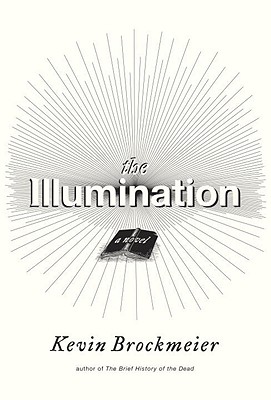 Your top five authors:
Your top five authors:
Okay, the criteria: (1) I must have read the author's entire body of work, or at least everything that's available in English; (2) I'm making my judgment on the basis of what I consider to be each author's four best books; and (3) I'm denying the urge to touch up the results. So then: Italo Calvino, William Maxwell, Peter S. Beagle, Leo Tolstoy and Walter Tevis.
Book you've faked reading:
I have the mad compulsion to finish nearly every book I start, though I've outright given up on two and temporarily stalled out on a few others. I confess that right now I'm finding it difficult to resume reading The Koran, in the Laleh Bakhtiar translation, though I do intend to return to it eventually.
Book you're an evangelist for:
There are so many, but one set of books whose delights I've been singing recently is the Neighborhood series by Goncalo M. Tavares--Mister Valery, Mister Brecht, Mister Juarroz and four others--which remain undistributed in the U.S. and thus very hard to track down. (Publishers: a remedy!) To my knowledge, the only English-language edition of the books is produced by Roopanjali Roy of Transbooks, a tiny press that specializes in translating from the Portuguese into the English for Continental Indian readers. The series is an immensely entertaining suite of fictions that pretends to offer a window into the storytelling minds of seven famous writers who happen to live next door to each other. It inspired Jose Saramago to write that Tavares "burst onto the Portuguese literary scene armed with a wholly unique imagination that broke every link with what was current in imaginative fiction."
Book you've bought for the cover:
Hmm. I've bought a great many books for their covers plus--plus a recommendation, plus my love for the author's other books, plus the first few sentences, plus my faith in the press. But for the cover alone? Perhaps the Scribner hardcover of Chloe Hooper's A Child's Book of True Crime, with its mysterious classical simplicity, its beautiful deep textured red tone, and its stylized swan's neck hiding a glossy black question mark.
Book that changed your life:
The Fat Man in History by Peter Carey certainly changed my reading life. I discovered the book by chance during my first summer of college, and it broadened my palate considerably. Something about its conjoined flights of acidity and sentiment, the precision of its prose, and the use it made of various fantastic conceits offered the perfect window into contemporary literature for a lifelong science fiction reader such as myself. The book is Carey's very earliest work, and I'm not sure he himself even likes it any longer, but I owe it a great debt.
Favorite line from a book:
Again, there are far too many to name, but here are two, one from a book I just finished:
"Wombs're rooms made of mothers. Graves're rooms made of soil."--from Black Swan Green by David Mitchell.
And one that's currently adorning a notecard on my desk:
"In the end the self is left unfinished, it is abandoned because of the death of its owner. All the exceptional details, confessions, secrets, photographs of loved faces and sometimes more than faces, precious addresses, towns and hotels meant to be visited given the time, stories, sacred images, immortal lines, everything heaped up or gathered because it is intriguing or beautiful suddenly becomes superfluous, without value, the litter of decades swirls at one's feet."--from Burning the Days: Recollection by James Salter.
Book you most want to read again for the first time:
Housekeeping by Marilynne Robinson, which, as many times as I've read it, never fails to move me with its sadness, its beauty and its poetry.
Five authors who should be (but, bafflingly, usually aren't) at the center of any conversation about the finest living American fiction writers:
Peter S. Beagle, Kate Bernheimer, Thomas Glave, Lydia Millet and Peter Orner.
Ivory from Paradise by David Schmahmann (Academy Chicago Publishers, $24.95 Hardcover, 9780897336123, February 2011)
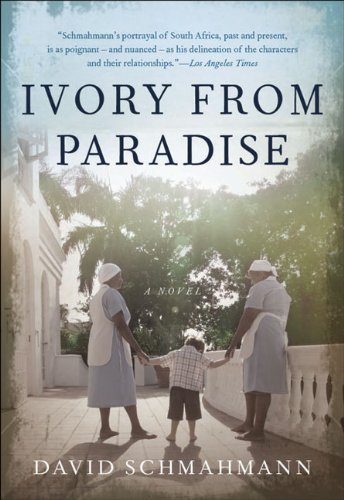 As the story begins, Helga, matriarch of a prominent white family from Durban and a firebrand anti-apartheid activist, lies dying in the London mansion of her second husband, industrialist Arnold Miro. Her children, Danny and Bridget, now married and living in Boston, have come to be with her in her last days. A simple domestic drama? One where grieving adult children bid farewell to their beloved mother?
As the story begins, Helga, matriarch of a prominent white family from Durban and a firebrand anti-apartheid activist, lies dying in the London mansion of her second husband, industrialist Arnold Miro. Her children, Danny and Bridget, now married and living in Boston, have come to be with her in her last days. A simple domestic drama? One where grieving adult children bid farewell to their beloved mother?
That is merely the jumping-off point for Schmahmann's (Empire Settings) beautifully realized exposition of family, myth, the stories we tell ourselves about our lives and of apartheid itself.
Helga married Arnold just a year after her husband Silas's death, and left South Africa forever for the lush life in London. Arnold is a controlling, sadistic bully. Danny, as narrator, says: "I realized on my first visit to Arnold's house... when I heard Arnold refer to my father's collection as 'curios,' as if they had been picked up at some roadside stand, that he was among those who found the entire notion of owning and displaying anything African absurd." That is, until it became popular to own African folk art and Arnold discovered that these "curios" could be valuable.
Silas's collection, especially a pair of ivory elephant tusks believed to have once belonged to Shaka Zulu himself, now prominently displayed in Arnold's home, become symbols in the story for all that we remember about our lives, and all that memory rewrites, often those parts we don't care to look at.
The family--Bridget, her husband and daughter; Danny and his wife--are openly at odds with Arnold, who insists that Helga wants him to have everything that was hers. While Arnold is visiting his mistress, the family removes Helga from her deathbed to a sorry little flat, along with everything they believe to be theirs.
Some time after Helga's death, the family goes back to Durban at Bridget's insistence, to hold a memorial. It is a disaster, poorly attended, awkward, and features Arnold arriving, unannounced, to take center stage. Also present is Baptie, the African maid/nanny who cared for Danny and Bridget when they were children. They now take care of her, granting her a lavish pension. She acts as the Greek chorus, sorting out all that is true from what Helga's family would like to hold onto as true. She is the realist in the story. The night before the memorial, Baptie's son, Eben, and Danny meet for a drink; Schmahmann, in their conversation, writes beautifully of white guilt, African rage, money, Baptie's remembrance of apartheid days as her golden days, how difficult everything is now in the semi-chaos of African rule.
Danny has learned something about his father's collection; Eben has learned that the Zulu warrior after whom his son, now imprisoned for murder, has renamed himself, never existed. These are just two of the illusions and contradictions woven in and out of this story, making it poignant and unforgettable. In the end, Danny says of the tusks, "Their provenance, like ours, is incomparable."--Valerie Ryan
Shelf Talker: A South African family returns to Durban to memorialize their mother and discovers the fragility of what they have always believed about themselves.
Yesterday, 10 minutes before the doors opened, I waited outside the Borders Bookstore in Saratoga Springs, N.Y. A handful of people were there, chatting about the impending closure, sharing a few facts--gleaned from local news outlets that had gleaned them from AP reports--but skewing their interpretations with a dose of imagination 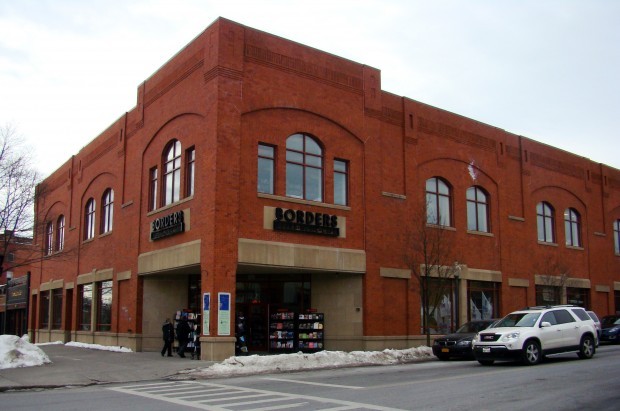 and misunderstanding about the book trade in general. Books are their avocation, after all, not their vocation.
and misunderstanding about the book trade in general. Books are their avocation, after all, not their vocation.
Then they stopped talking, shuffled their feet in the cold morning air as traffic passed by on Broadway. Peering through the plate glass windows, I could see only that it was dark and quiet inside, showing no signs--literal or figurative--that anything had changed during the past 24 hours. Perhaps the staff was sharing retail war stories and talking about their uncertain future in the back somewhere. Maybe books were being shelved. Probably coffee was brewing in the café.
The uneasy anticipation made me think, for no logical reason, about old black-and-white World War II movies, particularly the inevitable scene in which two GIs wait in a foxhole and one says, "You hear that?" His buddy replies, "I don't hear nothing." To which the first soldier responds ominously, "That's what I mean."
I'd only visited this Borders three
times since moving to Saratoga last summer. It's located in a prime, high-rent downtown location on Broadway, with 25,000 square feet of floor space spread over a two-story, open floor plan. Borders customers here may be mourning the fate of their store, but Saratoga's prospects for filling the vacant space are quite positive compared with many of the other doomed locations nationwide.
"I'm optimistic given the flexibility of the building itself, the parking lot and the location we're going to be pretty successful in finding new uses in a pretty short amount of time," Todd Shimkus, president of the Saratoga Chamber of Commerce, told the Glens Falls Post-Star.
The Albany Times Union noted that even the owners of the city's only independent, which sells used and rare volumes, expressed disappointment at the loss of the chain bookshop around the corner. "We feel for the people who love new books because that was their downtown bookstore," said Janice DeMarco of Lyrical Ballad Bookstore. "It's going to leave a void."
Her husband, John, told Fox-23 News: "We're very sorry to see people lose their jobs; we're very sorry to see the hole in Saratoga Springs. My wife and I have been in the forefront of trying to keep downtown Saratoga active and alive. It's not good to see."
DeMarco added that "it would be great to see an independent new bookstore on a smaller scale, which the big chains drove out for years. We used to have a smaller independent bookstore in Saratoga, but they couldn't compete, so they left."
The overall impact of Borders departure may not be quite as extreme here as in other communities. For unreformed chainiacs, a Barnes & Noble is located just a few miles outside the city in Wilton. And within a half-hour's drive, there are some excellent indie options: to the south, the Book House of Stuyvesant Plaza in Albany and Market Block Books in Troy; to the north, Red Fox Books in Glens Falls; and to the east, Battenkill Books in Cambridge. 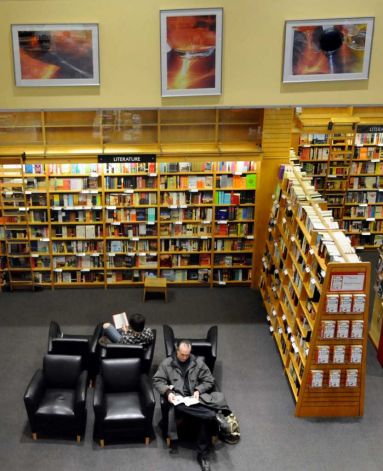 But this Borders was the local community bookshop for a lot of people in this city. Yesterday, I sat in the café for a while, sipping my cup of Seattle's Best, watching and listening. Customers asked the usual morning questions, which seemed loaded--How are you? What's new?--and then expressed sympathy and occasionally surprise. Staff members explained, patiently, the situation as well as they could under the circumstances. There were still many things they didn't know.
But this Borders was the local community bookshop for a lot of people in this city. Yesterday, I sat in the café for a while, sipping my cup of Seattle's Best, watching and listening. Customers asked the usual morning questions, which seemed loaded--How are you? What's new?--and then expressed sympathy and occasionally surprise. Staff members explained, patiently, the situation as well as they could under the circumstances. There were still many things they didn't know.
Customers browsed the stacks as if the day was like any other. An older man in the café joked: "People won't know where to find me in the morning now." And then, within minutes, the conversation turned to gossip and sports and local politics, which reminded me of Tip O'Neill's line that "all politics is local." Sometimes all corporate decisions is local, too.
If you still have a great indie in your city, you're fine. If you're a Borders fan and your
store dodged the executioner's axe, you're also fine... for now. It's about perspective. Although indie bookseller blood runs in my veins, I understood the mood in that bookstore yesterday. They were not fine. I remembered my favorite perspective example: an imaginary headline in the April 15, 1912, issue of Parrot's Weekly Magazine: "Titanic Sinks! No Parrots Hurt!"--Robert Gray (column archives available at Fresh Eyes Now)
The following were the most-ordered upcoming hardcover fiction titles on Edelweiss during the last 60 days. The listings include links to the titles on Edelweiss and links to the publishers' e-catalogues:
[Many thanks to Above the Treeline and Edelweiss!]
The following were the bestselling titles at independent bookstores in and around Chicago during the week ended Sunday, February 13:
Hardcover Fiction
1. A Discovery of Witches by Deborah Harkness
2. Swamplandia! by Karen Russell
3. Room by Emma Donoghue
4. While Mortals Sleep by Kurt Vonnegut
5. The Weird Sisters by Eleanor Brown
Hardcover Nonfiction
1. Battle Hymn of the Tiger Mother by Amy Chua
2. One Goal Achieved by Chicago Blackhawks
3. Known and Unknown by Donald Rumsfeld
4. The Immortal Life of Henrietta Lacks by Rebecca Skloot
5. Cleopatra by Stacy Schiff
Paperback Fiction
1. The Postmistress by Sarah Blake
2. The Imperfectionists by Tom Rachman
3. Major Pettigrew's Last Stand by Helen Simonson
4. Pictures of You by Caroline Leavitt
5. A Gate at the Stairs by Lorrie Moore
Paperback Nonfiction
1. The Big Short by Michael Lewis
2. Zeitoun by Dave Eggers
3. The Quants by Scott Patterson
4. The Other Wes Moore by Wes Moore
5. Just Kids by Patti Smith
Children's Books
1. Mockingjay by Suzanne Collins
2. Silverlicious by Victoria Kann
3. A Sick Day for Amos McGee by Philip Christian Stead
4. Moon Over Manifest by Clare Vanderpool
5. Delirium by Lauren Oliver
Reporting bookstores: Anderson's, Naperville and Downers Grove; Read Between the Lynes, Woodstock; the Book Table, Oak Park; the Book Cellar, Lincoln Square; Lake Forest Books, Lake Forest; the Bookstall at Chestnut Court, Winnetka; and 57th St. Books; Seminary Co-op; Women and Children First, Chicago.
[Many thanks to the booksellers and Carl Lennertz!]